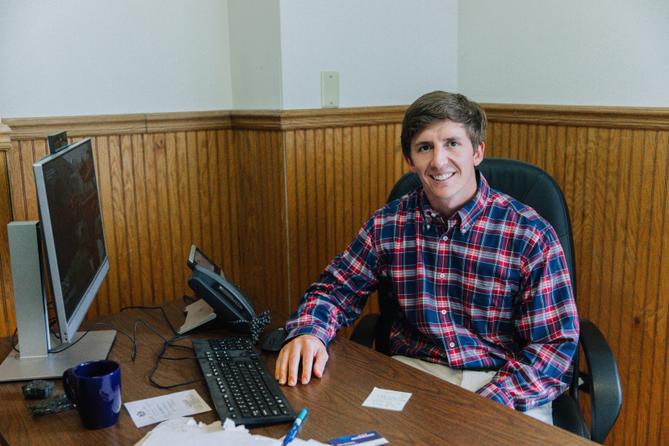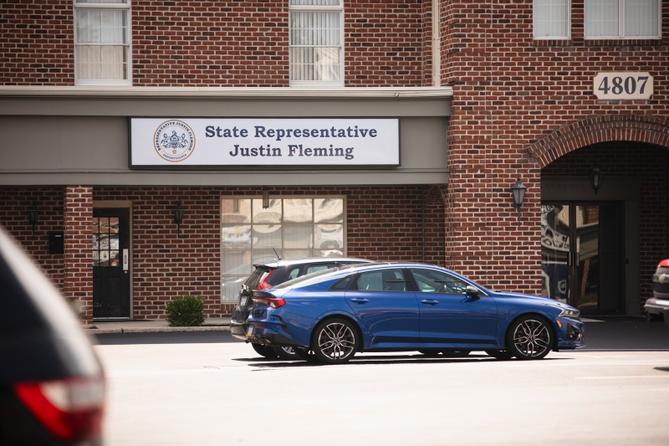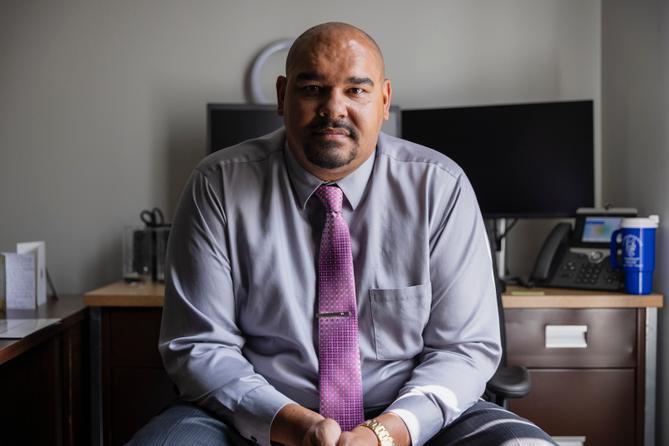Spotlight PA is an independent, nonpartisan, and nonprofit newsroom producing investigative and public-service journalism that holds the powerful to account and drives positive change in Pennsylvania. Sign up for our free newsletters.
HARRISBURG — Power struggles and a political scandal. Brinkmanship and backroom deals. Promises and perfidy.
All have marked the first nine months of the Pennsylvania legislature’s latest two-year session, one of the most chaotic and turbulent in decades — and one still in a slow boil thanks to a weeks-long budget dispute.
For first-time legislators, the jolting introduction to politics and policymaking in Pennsylvania’s Capitol has been challenging. Newcomers to the state House of Representatives, which has played a starring role in the drama, have shouldered the brunt of it.
Since January, Spotlight PA has regularly interviewed three state House representatives — two Democrats, and one Republican — as they navigated their first year in office. The trio, state Reps. Justin Fleming, Tarik Khan, and Dallas Kephart, entered a divided legislature with one of the biggest classes of new lawmakers in recent memory. All were elected under new legislative maps that promised to make the General Assembly more representative of the state’s political diversity.
The three representatives come from different backgrounds and political perspectives. Khan is a nurse who agitated from the outside for safer staffing levels in hospitals. Fleming is a longtime advocate with a near unshakeable belief in the government's ability to help people build better lives. And Kephart is a lawyer and a former coal miner on a mission to block what he views as bad policy.
Like many of their colleagues, these new lawmakers have seesawed between high and low moments, and have watched their chamber lurch from one crisis to another: a bruising leadership fight, a sexual harassment scandal, a budget stalemate.
As the state House prepares to reconvene late next month, lingering tensions over key pieces of the state budget that remain incomplete weeks after the June 30 deadline could rack the fall session with more gridlock and partisan fights.
The lawmakers have at times become exasperated by the constant conflict, despite growing somewhat accustomed to it.
“Part of the reason why I ran — and this is why this has been a little bit frustrating for me — is I want this enterprise to run well,” said Fleming, a Democrat who represents portions of suburban Harrisburg. “I want government to serve the folks it's supposed to serve.”
But from the start of the session, government in the Capitol didn’t operate smoothly. In the state House, in fact, it barely operated at all for a time.
The power struggle
Even before the chamber was sworn in for its new two-year session in January, there was a fight over power.
Democrats’ unexpected wins in last November’s midterms had landed them a one-seat majority — their first in more than a decade. The upset would give them control of the chamber, and by extension, determine which ideas actually have a chance of becoming law.
But because of vacancies in three Democrat-held seats, the party was temporarily in the minority. That unique set of circumstances prompted a stealth fight to capture the chamber’s top job of speaker.
As first-year lawmakers, Fleming, Kephart, and Khan weren’t privy to the high-level plotting, but Kephart understood this much: “It was going to be a volatile time.”
What happened was an attempted power grab by state House Republican leaders. The speakership was widely expected to go to Democratic state Rep. Joanna McClinton of Philadelphia. But Republicans engineered an 11th-hour deal behind closed doors to vote for state Rep. Mark Rozzi, a moderate Berks County Democrat. In exchange, GOP leadership said Rozzi would become an independent.
The defection would have left the state House tied 101-101, with one independent.
Kephart, a Republican who represents a mostly rural swath of west and central Pennsylvania, said he learned of plans to nominate Rozzi just a half hour before the vote to give him the speaker’s gavel.
“I explained to people that came with me that day — this is Harrisburg,” Kephart said in late January.

The plan fizzled. Once speaker, Rozzi didn’t drop his Democratic affiliation. Then resentments among both parties prevented the chamber from formally organizing and brought business to a halt for weeks.
During that time, state House members weren’t able to introduce bills, vote on them, or get assigned to legislative committees.
Khan, a northwest Philadelphia Democrat, had to pump the brakes on introducing a bill that would improve staffing standards for nurses. He had championed the legislation for much of his 16 years as a nurse practitioner.
Instead, Khan and other state House Democratic rookies focused on advocating for new operating rules for the chamber that they believed would foster bipartisanship by creating a more level playing field between the closely divided parties.
But Khan’s perspective on bipartisanship began to shift as he witnessed Harrisburg’s political maneuvering first-hand.
The shift started as his chamber began contemplating approving a constitutional amendment that would give survivors of childhood sexual abuse a two-year window to pursue civil litigation.
Though the measure had passed with overwhelming support in the previous two-year session, it got swept up in the speakership struggle.
“That was a little toxic,” he said in late February. “Not completely destructive, but like a piece of hair in your food.”
“Seeing some of the filibustering happening and the tricks — this isn’t what we’re here for.”
As the state House’s business ground to a halt, the lawmakers said they leaned hard into their district office’s work, which included setting up new offices, hiring key personnel, and helping constituents with issues involving state government agencies. The work became one of the most satisfying parts of the job in those early months.
“In this enterprise, you control what you can control,” Fleming said. “And what I can control is the effort I put forth every day in service of the residents of the 105th District.”

A brief respite, then a scandal
The logjam in the state House didn’t break until late February, nearly two months after the start of the session. For a day, things moved fast: Rozzi agreed to resign from the speakership. And in a historic moment, McClinton was voted into the speaker’s job, becoming the chamber’s first woman and second Black lawmaker to hold the post.
The vote was supposed to represent an end to the chaos.
But the next round of upheaval was just hours away: A lobbyist went public with the accusation that then-state Rep. Mike Zabel, a Democrat from Delaware County, had sexually harassed her.
Zabel’s subsequent resignation set the stage for yet another special election, one that would determine the balance of power in the chamber. Once again, legislative leaders paused voting days in the Capitol.
For first-year legislators trying to prove themselves on the job and to their constituents, the inaction was uniquely stressful.
On most days, Fleming is relentlessly optimistic. He believes deeply that effective government can change lives. His conviction stems from personal experience: Government programs helped him escape the poverty he experienced growing up on the outskirts of Harrisburg.
He also has worked in and around the Capitol for much of his career, including as a press and media relations officer in former Democratic Gov. Ed Rendell’s administration and as an advocate for nonprofits specializing in child welfare and mental health. He understands the legislative process can be messy.
But by early spring, the persistent disruptions were testing his faith. Like many of his first-year colleagues, he had a list of policy issues he wanted to tackle.

A silver lining for Fleming was being able to spend more time in his district, where he found constituents weren’t as concerned about the day-to-day fights unfolding in the Capitol.
Kephart echoed that sentiment throughout the year. He found that his constituents care very little for the backroom negotiations. They were more concerned that Kephart showed his face in his district and regularly talked with them.
“Do you know how many people asked me how I voted? None. But they remember, ‘Oh he went to my birthday party,’” Kephart said.
He went on to predict, “It'll be May before we can vote on anything.”
A return to action
Kephart wasn’t far off. The state House held its first full week of session in late April, nearly four months into the new term.
The lost time turned May and early June into an uncorked firehose of legislative action in House committees and on the chamber floor.
For Kephart, that surge revealed a hard truth that veteran lawmakers who aren’t in the majority know well: Much of the legislation the freshman Republican proposes won’t make it past a committee vote, let alone a full floor vote.
That is because the majority party controls committee assignments — including the chairs of those committees — as well as which bills are called up for a vote.
“I can go to Harrisburg, but I need a legislature to help me,” Kephart said in late January.
Of the three lawmakers, Kephart had had the least exposure to how the Capitol operates. He was 26 and barely out of law school when he was elected. (He has since turned 27.)
Coming to Harrisburg, the self-described “political nerd” said a big issue for him and his constituents was the fate of the Regional Greenhouse Gas Initiative.
RGGI is an interstate agreement aimed at combating climate change by limiting the amount of carbon emissions that energy producers can emit. Opponents of the agreement say it would increase the cost of utilities and endanger power plant jobs.
Though the agreement is currently held up in court, Kephart has co-sponsored a repeal bill — although he is not optimistic about its chance for success. Democrats, he said, are unlikely to bring it up for a vote.
Kephart said he often focuses on blocking bills he thinks would negatively impact the energy industry not only by voting against them but by lobbying other lawmakers to do the same. As a member of the state House Environmental Resources and Energy Committee, he gets early looks at any energy bills that might come to a floor vote.
“Sometimes the role is to prevent bad things from happening,” Kephart said.
For most of the spring session leading up to summer budget negotiations, Democrats in the chamber pushed bills they had been blocked from advancing when they were in the minority in the previous decade. These included proposals to raise the minimum wage and expand discrimination protections based on sexual orientation and gender identity.
Those measures passed along largely partisan lines.
“I don't know if this was naivete or what, but I just wasn't prepared for quite how partisan it would be,” said Fleming, who with state Rep. Thomas Kutz (R., Cumberland) established a new caucus for younger lawmakers who want to take a bipartisan approach to policymaking. “And that was a struggle for me because I made my career working with both sides.”
There were some exceptions.
Fleming’s first bill to pass the chamber received a vote of 200-3 in late June. The measure would make it easier and less costly to repudiate or disavow restrictive covenants from real estate deeds that historically have been used to prevent the sale of homes to people based on race, ethnicity, or religion.
The bill, Fleming said, was strengthened by suggestions from a Republican colleague, feedback that helped it garner broad support on the House floor.
“That’s how it’s supposed to work,” he said.
Khan’s first bill to pass the chamber — the proposal to mandate specific nurse and patient staffing levels — also received GOP buy-in.
He found a key ally in a Republican: state Rep. Tom Mehaffie of Dauphin County, who served as the measure’s prime sponsor. Khan’s job was whipping votes.

He said he got all of the Democratic first-years to co-sponsor the bill, wrote letters to leadership emphasizing his support for the measure, and reached out to some of his colleagues across the aisle.
The bill was personal for Khan: He had advocated for it while president of the Pennsylvania State Nurses Association.
“Everyone knows, ‘Safe staffing is important to Tarik,’” Khan said. “It’s just something that I can understand.”
Right before the vote, Khan spoke on the floor, detailing his time as a nurse and how he felt mandatory staffing ratios could have helped him. He described the bill as the culmination of decades of advocacy by nurses.
“I didn’t expect to get emotional, I didn’t expect it to land like that,” Khan said.
“It was in the middle of session so as soon as it passed, we cheered and then we went right to another bill.”
The ‘betrayal’
For a few weeks, it appeared talks between the legislature and Democratic Gov. Josh Shapiro on the state budget would result in a deal — if not by the June 30 deadline, at least close to it.
But negotiations collapsed after Republicans who control the state Senate accused Shapiro of reneging on an agreement to allocate $100 million in taxpayer dollars for private school vouchers. To win the support of state House Democrats, Shapiro had vowed to veto a portion of the budget bill the state Senate passed that created a voucher program.
With no deal in sight, both chambers recessed for the summer — once again in a stalemate. The main budget bill has since been signed into law, but supplemental legislation needed to complete the process hangs in the balance. The voucher question also remains unresolved, and could stymie action on other legislation when state House lawmakers return in late September.
After the events of this summer, Kephart predicts next year’s budget negotiations will be even more complicated. Kephart said Shapiro backtracked from a promise when he vetoed the voucher program, and that will cause Republican members to turn away from working with their Democratic counterparts.
“The well’s been poisoned a bit,” Kephart said in August.
Khan has a different perspective. He said that he’s been able to get to know more of his Republican colleagues throughout the year and sees room for collaboration in the fall, particularly when it comes to issues such as affordable housing and care for older Pennsylvanians.
“I think we get bogged down on some of the cultural hot-button issues. We forget so many of the other things,” Khan said. “The more that I get to know people in the Republican caucus, the more I’m going to find those allies.”
For state House members, there is another pressure point.
Unlike their state Senate colleagues, representatives run for reelection every two years. Next year’s primary is in April. That doesn’t leave much time to convince constituents to grant them another term — a sentiment felt more acutely by first-time legislators who don’t have an established track record.
“We are seven months away from a primary, and all the elements that go into that,” Fleming said in early August. “That’s a big challenge for me, and something that frankly I’ve been thinking about.”
Despite the string of upheavals, Fleming is optimistic about what “can be.”
“I haven’t become cynical and jaded,” he said. “If that does end up happening … I will try to do something else, where I can be positive, where I can be uplifting. And try to help people. But I'm not there yet.”
BEFORE YOU GO… If you learned something from this article, pay it forward and contribute to Spotlight PA at spotlightpa.org/donate. Spotlight PA is funded by foundations and readers like you who are committed to accountability journalism that gets results.

